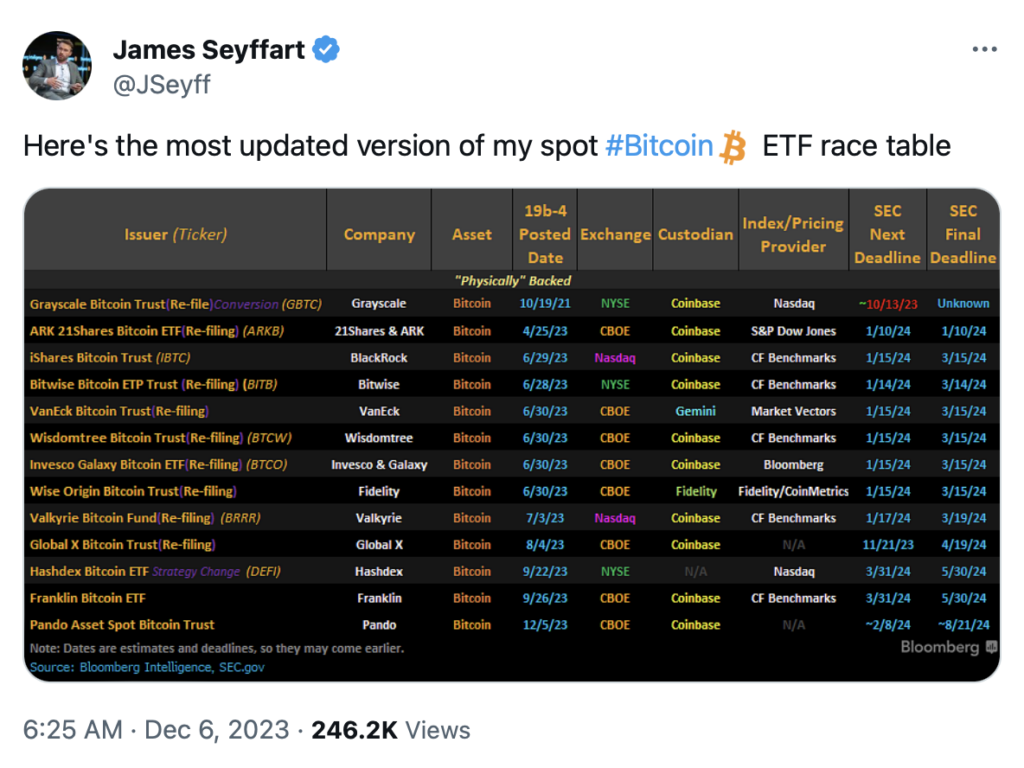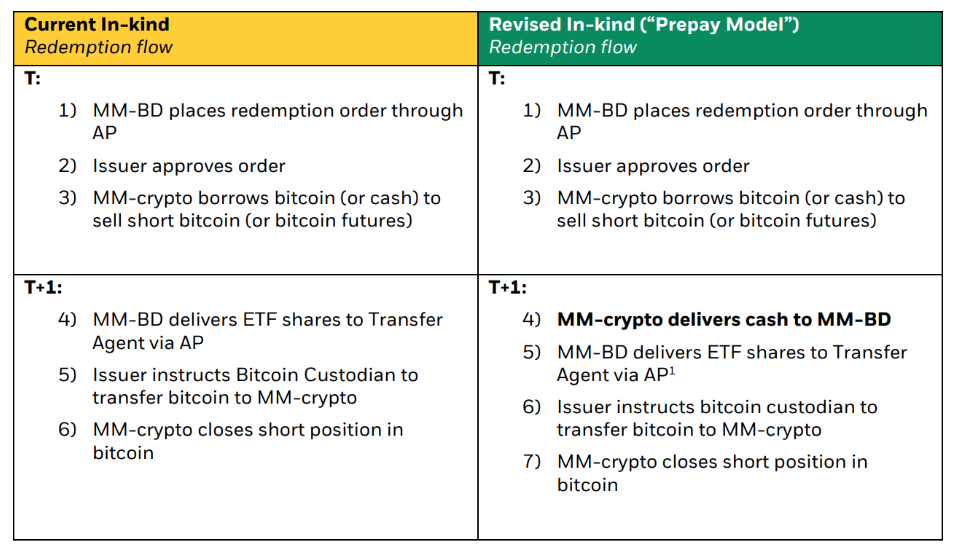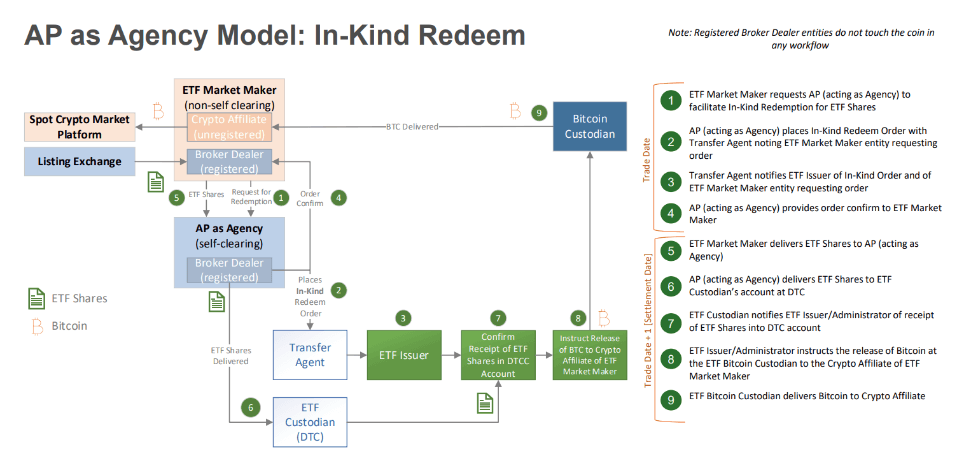It has been extensively accepted that Bitcoin ETF purposes have been the primary driver for Bitcoin’s return to the April 2022 degree at above $40k. The thesis is easy: with a brand new layer of institutional legitimacy, the capital pool for Bitcoin influx would deepen.
From hedge funds and commodity buying and selling advisors (CTAs) to mutual and retirement funds, institutional traders have easy accessibility to diversify their portfolios. And they’d achieve this as a result of Bitcoin is an anti-depreciating asset.
Not solely in opposition to forever-depreciating fiat currencies however in opposition to not-so-capped gold. In distinction, Bitcoin will not be solely restricted to 21 million however its digital nature is secured by the world’s strongest computing community. To date, 13 candidates have maneuvered to function institutional Bitcoin gateways.

In accordance with Matthew Sigel, VanEck’s Head of Digital Asset Analysis, SEC approvals will probably deliver “greater than $2.4 billion” in H1 2024 to spice up Bitcoin value. Following the SEC’s courtroom battle loss in opposition to Grayscale Funding for its Bitcoin trust-ETF conversion, the Bitcoin ETF approvals at the moment are perceived as near-certainty.
Most lately, SEC Chair Gary Gensler met with Grayscale representatives alongside seven different Bitcoin ETF candidates. Later, in a CNBC interview, Gensler confirmed that the trail to Bitcoin ETFs is a matter of finding out technicalities.
“We had previously denied various these purposes, however the courts right here within the District of Columbia weighed in on that. And so we’re taking a brand new take a look at this based mostly upon these courtroom rulings.”
Probably the most telling indicator in that path is that BlackRock, the world’s largest asset supervisor, has built-in Wall Road-friendly guidelines. In that framework, banks might take part as licensed contributors (APs) in Bitcoin ETF publicity. That is additionally notable on condition that Gary Gensler himself is a former Goldman Sachs banker.
Contemplating this probably horizon, what would the Bitcoin ETF panorama seem like?
The Function and Issues of Custodians in Bitcoin ETFs
Of 13 Bitcoin ETF candidates, Coinbase is the BTC custodian for 10. This dominance isn’t a surprise. BlackRock partnered with Coinbase in August 2022 to hyperlink BlackRock’s Aladdin system with Coinbase Prime for institutional traders.
Moreover, Coinbase has established a comfortable relationship with authorities companies, from ICE and DHS to Secret Service, to supply blockchain analytics software program. On the identical time, the most important US crypto change retains monitor of regulation enforcement and company data requests in annual transparency studies.
Because the favored decide, Coinbase would serve the twin function of crypto change and ETF custodian. This drove Coinbase (COIN) shares to new highs this yr, making ready to shut 2023 at +357% positive aspects. Then again, the exact same SEC that regulates Coinbase as a publicly traded firm, sued Coinbase in June 2023 for working as an unregistered change, dealer, and clearing company.
In accordance with Mike Belshe, BitGo CEO, this might trigger friction on the trail to Bitcoin ETF approvals. Particularly, Belshe views Coinbase’s fusion of service provider and custodial companies as problematic:
“There are various dangers in establishing the Coinbase enterprise that we don’t perceive. There’s a excessive chance that the SEC will refuse to approve purposes till these companies are fully separated,”
Beforehand, the SEC’s often-stated reasoning behind Bitcoin ETF refusal revolved round market manipulation. As an example, because the recipient of BTC flows, Coinbase might front-run ETF orders simply earlier than ETF order execution to revenue from the worth differential.
The SEC has insisted on strict buying and selling controls and market surveillance to forestall potential market manipulation. That is on high of the prevailing partnership between Coinbase and Cboe World Markets for surveillance-sharing.
Suffice to say, it’s within the curiosity of Coinbase and its COIN shareholders to not erode the integrity of BTC custody. Of higher significance is how Bitcoin redemptions will likely be completed.
In-Type vs. In-Money Redemptions: Analyzing the Choices
The Bitcoin ETF idea revolves round BTC publicity whereas avoiding the potential pitfalls of BTC self-custody. In any case, it has been estimated that as much as 20% of Bitcoin provide is without end misplaced resulting from forgotten seed phrases, phishing and different self-custody foibles.
As soon as that extra centralized BTC publicity is completed, how would traders redeem the publicity? Along with market surveillance, this has been the SEC’s point of interest, bifurcating redemptions into:
- In-kind redemptions: Whereas present Grayscale (GTBC) shares aren’t immediately redeemable for Bitcoin, counting on the secondary market as an alternative, Bitcoin ETFs would change that. The aforementioned licensed contributors (APs) would be capable of change BTC ETF shares for a corresponding BTC quantity.
That is the popular strategy of most Bitcoin ETF candidates, given its widespread use in conventional inventory/bond ETFs. This strategy would additionally profit the market, because it minimizes the danger of value manipulation by avoiding the necessity for large-scale BTC gross sales. As a substitute, APs can regularly promote their bitcoins with out flooding the market to artificially suppress the worth.
- In-cash redemptions: By default, this strategy is reductionist, providing a extra direct BTC-to-fiat pipeline when APs change ETF shares for money.
Provided that the SEC is part of the USG fiat system, the watchdog company prefers it. In-cash redemptions would shut the redemption lifecycle loop by preserving the capital in TradFi as an alternative of exploring BTC custody.
As of the November twenty eighth memorandum between the SEC and BlackRock, it’s clear that the strategy will not be but settled. BlackRock revised its in-kind redemption mannequin, following the SEC’s concern on market maker (MM) threat. Within the new mannequin, there could be a further step between the MM and the market maker’s registered dealer/supplier (MM-BD).

In opposition to the in-cash mannequin, the revised in-kind mannequin would take away the necessity to pre-fund promote trades. Which means that ETF issuers don’t need to promote belongings/increase money to satisfy AP redemption requests. Regardless of the complexity, this wouldn’t impression unlevered free money circulation.
Furthermore, market makers would burden the danger of redemption execution as an alternative of that threat falling onto APs. With decrease transaction prices and higher bulwark in opposition to market manipulation, BlackRock’s most popular in-kind redemptions seem to realize floor.
One other giant asset supervisor, Constancy Investments, additionally prefers an in-kind mannequin as famous within the December seventh memorandum.

It’ll then be as much as the SEC to set the post-Bitcoin ETF panorama.
Market Implications and Investor Views
Within the short-run, following the Bitcoin ETF approvals, the VanEck analyst estimates $2.4 billion influx. VanEck forecasts a $40.4 billion deeper capital pool throughout the first two years.
Within the first yr, Galaxy researcher Alex Thorn sees over $14 billion in capital accumulation, which might push the BTC value to $47,000.
Some analysts are extra optimistic, nevertheless. The Bitwise analysis crew forecasts that Bitcoin ETFs is not going to solely be “probably the most profitable ETF launch of all time” however that Bitcoin will commerce above the brand new all-time-high of $80k in 2024.
If the SEC follows by means of on its anti-crypto custom, it might decide some particulars that will have a deterrent impact. As an example, a excessive redemption threshold would disincentivize APs to create BTC ETF shares within the first place as a result of the upfront price of shopping for a considerable amount of bitcoins could be perceived as too burdensome and dangerous.
Living proof, present gold ETF redemptions, handled as atypical earnings, incur 20% long-term capital positive aspects tax. Then again, in-cash redemptions wouldn’t set off a taxable occasion till Bitcoin is offered.
If the SEC approves in-cash fashions for some candidates, traders could be extra incentivized to redeem ETF shares in money as an alternative. In flip, this might result in higher value manipulation potential.
Altogether, the SEC has ample wiggle room to put a big downward strain on the worth of Bitcoin, however its acknowledged aim of investor safety.
Conclusion
2024 is poised to be the trifecta yr for Bitcoin. With Bitcoin ETF inflows, the market additionally expects the 4th Bitcoin halving and the Fed’s ingress into charge cuts. Within the meantime, the greenback will proceed to erode, even within the best-case state of affairs of two% annual inflation charge.
The latter two drivers could even overshadow Bitcoin ETFs, regardless if the SEC opts for in-kind or extra downward-loaded in-cash redemptions. In both case, Bitcoin is poised to cross a brand new legitimacy milestone. This itself is sure to please Bitcoin holders over the next years.

